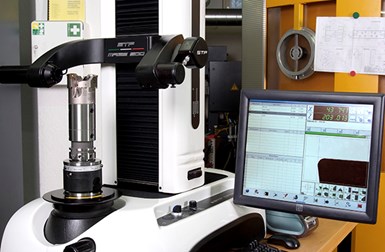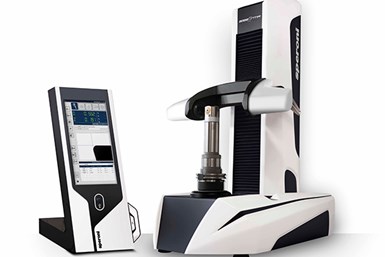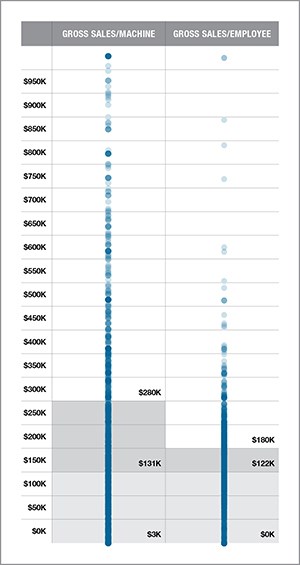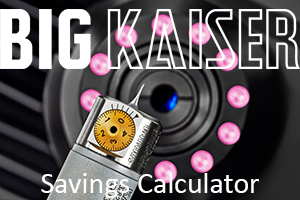Why Do Top Shops Use Tool Presetters?
Sponsored ContentLooking at the data from Gardner Intelligence’s Top Shops survey, we can see patterns that show why high-performing shops tend to use tool presetters.
Share
Every year, Gardner Intelligence conducts a survey of machine shops in partnership with Modern Machine Shop. The Top Shops survey is a benchmarking tool that enables participating shops to compare their performance against those of other machine shops. The survey covers topics as varied as machine tool types, HR programs, employee reward programs and cutting tool strategies.

The orange dots in this chart represent the percentage of Top Shops that use the listed tooling strategy, while the blue dots represent all other shops. As you can see, Top Shops are significantly more likely to use tool presetters.
One piece of information that emerged from the Top Shops survey was the difference in the use of tool presetters. Among Top Shops, 50% use tool presetters, compared to only 42% among other shops. Furthermore, the use of tool presetters correlates with higher spindle utilization rates and improved machine tool uptime. These data points suggest that high-performing shops, as well as those that run their machine tools constantly, have found presetters useful tools for their businesses. But what can we extrapolate from that?
To start, let’s look at the value that presetters add to a shop. Presetters enable manufacturers to measure tools ahead of machining in order to establish the true position of the insert or cutting edge, preferably while the machine tool is cycling through another job. The Speroni series from Big Kaiser, for example, uses a visual-scanning system and CNC controls to provide accurate measurements regardless of the operator’s skill or experience. Once accurate measurements are recorded, it is simple to equip the cutting tools in a CNC machine’s toolchanger during setup and enter the tool offset information.
While some believe that presetters are only useful for shops with large batches, job shops are well-positioned to benefit from them. A shop with a high mix and low volume frequently changes out tools not only to manage tool wear and avoid runout, but also to switch to a different job. Shops with such high mixes and frequent tool changes receive even more benefits from tool presetters, as time saved in setup is magnified.

Presetters like this Speroni Magis have advanced features such as digital reading and writing capabilities for tools equipped with identification chips.
Speroni presetters such as the Futura and Magis also have the option to come with digital reading and writing capabilities for tools equipped with identification chips. This enables the user to quickly load the cutting tool measurements into the CNC machine during setup, rather than entering it manually. This has the advantages of eliminating user error and reducing setup time even further. Combined with the micron accuracy and user-independent measurements, this also improves the precision of the CNC machine.

Presetters have the advantage of being able to measure cutting tools while the machine tool is working on another job. This can be a major time saver over touch probes, especially when a mill is going to be going through several tools in a setup.
But does the statistical evidence support the value of these benefits? Let’s look at the data we have from Top Shops. In our Top Shops survey, we asked machine shops many specific questions about the running of their shops, and we collect their answers to determine best practices. Of the highest rated shops in our survey – the Top Shops – we found that 50% use tool presetters, compared with only 42% of other shops. This tells us that there must be something of value in presetters like the Speroni series, but it does not tell us anything about profitability.

These graphs show the spread of shops according to gross sales per machine and gross sales per employee. The top-performing 25% of shops for both categories are pictured above the gray boxes.
Another Top Shops data point is the gross sales per machine. Dividing the respondents into four quartiles, we can see that 54% of shops with more than $281,000 in sales per machine last year used a tool presetter. For comparison, the bottom quartile – the 25% of shops with the lowest sales per machine – uses presetters at a rate of only 31%. A difference of 23 points is considerable, but gross sales per machine is not the best determiner of profit. For that, we should look to gross sales per employee.
A quick look at gross sales per employee – essentially a measure of income compared to labor – shows a much clearer picture. Of those shops with more than $180,000 in sales per employee, 55% use a tool presetter. On the other hand, only 29% of shops in the poorest-performing quartile use a tool presetter. According to Steve Kline, Chief Data Officer for Gardner Intelligence, this vindicates the argument for using tool presetters. “This is a significant difference in financial outcome,” he says. “Sales per employee is highly correlated with profitability in a shop, and the fact that it also correlates with the use of a tool presetter suggests that investing in these machines pays off.”
When you look at how presetters get used in shops, this data makes a lot of sense. The major advantage that tool presetters deliver is in time saved at the machining center. When a shop is getting started on a new job with 15 tool changes, using a touch probe to establish the position of the cutting edges can take an hour of machining time. Compare that to a presetter, which a machinist can use while another job is running. Even better, the machine can measure the cutting tool accurately in under a minute, which means it not only frees up machine time, but also significantly reducing the time drain on the shopfloor personnel. Freeing up attendant time means getting more work done in a day, leading to a more productive – and profitable – machine shop, as the data shows.
For more information on Speroni tool presetters, check out bigkaiser.com.
Check out past Top Shops webinars courtesy of Gardner Intelligence and Modern Machine Shop, and find more information about MMS Top Shops at gardnerintelligence.com.

